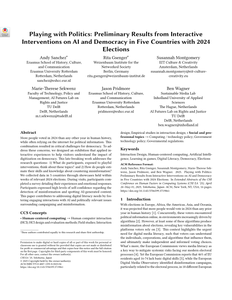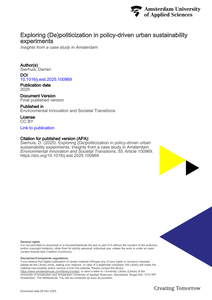In this chapter the autor explores the contours and possible effects of the WMO for the local government level. First she gives a short overview of the main features of the WMO (PAR. 2.5). Then she describes the challenges that local government is confronted with, especially the political decisions that have to be taken at the local level (PAR. 2.3). The question to be answered is whether or not the WMO means an impulse for local democracy in the Netherlands. To that purpose, two quick comparisons are made (PAR. 2.4): with other decentralisation operations in the Netherlands, and with the decentralisation of social care and welfare in Sweden. These comparisons make it possible to determine two main conditions for creating an impulse for local politics, which are presented in PAR. 2.5. The article ends by some concluding remarks on the effect of the WMO on the local democracy in the Netherlands.
DOCUMENT

More people voted in 2024 than any other year in human history, while often relying on the internet for political information. This combination resulted in critical challenges for democracy. To address these concerns, we designed an exhibition that applied interactive experiences to help visitors understand the impact of digitization on democracy. This late-breaking work addresses the research questions: 1) What do participants, exposed to playful interventions, think about these topics? and 2) How do people estimate their skills and knowledge about countering misinformation? We collected data in 5 countries through showcases held within weeks of relevant 2024 elections. During visits, participants completed a survey detailing their experiences and emotional responses. Participants expressed high levels of self-confidence regarding the detection of misinformation and spotting AI-generated content. This paper contributes to addressing digital literacy needs by fostering engaging interactions with AI and politically relevant issues surrounding campaigning and misinformation.
MULTIFILE

More and more local bottom-up energy initiatives are emerging. Those involved encounter many barriers during the realization of their ideas. As the generation of renewable energy is mostly included, these local initiatives contribute to the targets set at regional, national & EU level. At the same time, they are an indication that end-users themselves want to be part of the energy transition. What are the reasons for citizens to organize themselves and start and initiative? What kind of barriers do they encounter? What does this mean for roles and responsibilities of professionals? And to what kind of opportunities does this lead for products and services? Answers to these questions provide a solid starting point to develop methods and instruments to stimulate,facilitate and upscale local energy initiatives. This paper bundles the outcomes of three workshops and three additional interviews in the Netherlands as part of the European E-hub project. Conclusions can be drawn on needs and drivers, barriers, risks and solutions (lessons learned), possible roles for professionals and opportunities for new products and services.
DOCUMENT

The realization of human rights standards depends in part on the commitment of local actors. It can be argued that local public service professionals such as social workers can also be regarded as key players. The possible role of social workers becomes imperative if these professionals are working in a policy context that is not congruent with human rights. If existing laws or policies cause or maintain disrespect for human rights, social workers are in a position to observe that this is having an adverse impact on clients. When social workers are regarded as human rights actors, the question arises how they can or should respond to law and policy that impedes them in carrying out their work with respect for human rights. This article adds to existing theories on social workers as human rights actors by examining the practices of social professionals working in such a challenging policy context. The research took place among professionals in social district teams in the city of Utrecht, the Netherlands. Following a series of decentralizations and austerity measures the social care landscape in the Netherlands has changed drastically over the last few years. As a result, social workers may find themselves on the one hand trying to realize the best possible care for their clients while on the other hand dealing with new laws and policy expectations focused on self-reliance and diminished access to specialist care. The article explores how social professionals’ responses to barriers in access to care affect human rights requirements. In doing so, this socio-legal study provides insight into the ways in which everyday social work relates to the realization of human rights at the local level.
DOCUMENT

Citizen participation in local renewable energy projects is often promoted as many suppose it to be a panacea for the difficulties that are involved in the energy transition process. Quite evidently, it is not; there is a wide variety of visions, ideologies and interests related to an ‘energy transition’. Such a variety is actually a precondition for a stakeholder participation process, as stakeholder participation only makes sense if there is ‘something at stake’. Conflicting viewpoints, interests and debates are the essence of participation. The success of stakeholder participation implies that these differences are acknowledged, and discussed, and that this has created mutual understanding among stakeholders. It does not necessarily create ‘acceptance’. Renewable energy projects often give rise to local conflict. The successful implementation of local renewable energy systems depends on the support of the local social fabric. While at one hand decisions to construct wind turbines in specific regions trigger local resistance, the opposite also occurs! Solar parks sometimes create a similar variation: Various communities try to prevent the construction of solar parks in their vicinity, while other communities proudly present their parks. Altogether, local renewable energy initiatives create a rather chaotic picture, if regarded from the perspective of government planning. However, if we regard the successes, it appears the top down initiatives are most successful in areas with a weak social fabric, like industrial areas, or rather recently reclaimed land. Deeply rooted communities, virtually only have successful renewable energy projects that are more or less bottom up initiatives. This paper will first sketch why participation is important, and present a categorisation of processes and procedures that could be applied. It also sketches a number of myths and paradoxes that might occur in participation processes. ‘Compensating’ individuals and/or communities to accept wind turbines or solar parks is not sufficient to gain ‘acceptance’. A basic feature of many debates on local renewable energy projects is about ‘fairness’. The implication is that decision-making is neither on pros and cons of various renewable energy technologies as such, nor on what citizens are obliged to accept, but on a fair distribution of costs and benefits. Such discussions on fairness cannot be short cut by referring to legal rules, scientific evidence, or to standard financial compensations. History plays a role as old feelings of being disadvantaged, both at individual and at group level, might re-emerge in such debates. The paper will provide an overview of various local controversies on renewable energy initiatives in the Netherlands. It will argue that an open citizen participation process can be organized to work towards fair decisions, and that citizens should not be addressed as greedy subjects, trying to optimise their own private interests, but as responsible persons.
DOCUMENT

Urban experimentation has gained traction with (supra-)national and local politics as a method for catalyzing change in urban systems and practices. Yet, with experiments becoming more commonly driven by established actors, concerns persist about their potential to sidestep political issues of power, exclusion and conflict fundamental to societal change. This paper seeks to unpack what exactly is at stake when the political is ignored or neutralized during an urban experiment. Using theories on the political as an analytical lens, the paper presents a case study of an urban experiment in Amsterdam, dissecting the ways in which (de)politicization operates in the experiment. The findings demonstrate that ignoring the political in urban experimentation risks excluding certain voices and options from being considered, which ultimately leads to stagnation. The paper concludes by outlining future challenges for research and practice that addresses (de)politicization in urban experiments.
MULTIFILE

Abstract: The transition towards renewable and sustainable energy is being accompanied by a transformation of communities and neighbourhoods. This transition may have huge ramifications throughout society. Many cities, towns and villages are putting together ambitious visions about how to achieve 100% sustainable energy, energy neutrality, zero carbon emission or zero-impact of their communities. We investigate what is happening at the local community level towards realizing these ambitions from a social perspective. We use the case study approach to answer the following question: how do local community energy initiatives contribute to a decentralized sustainable energy system? We find that especially the development of a shared vision, the level of activities and the type of organisation are important factors of the strength of the ‘local network’.
DOCUMENT

In recent years, the fight against terrorism and political violence has focused more on anticipating the threats that they pose. Therefore, early detection of ideas by local professionals has become an important part of the preventive approach in countering radicalization. Frontline workers who operate in the arteries of society are encouraged to identify processes toward violent behavior at an early stage. To date, however, little is known about how these professionals take on this screening task at their own discretion. Research from the Netherlands suggests that subjective assessment appears to exist. In this article, we argue that the absence of a clear norm for preliminary judgments affects prejudice or administrative arbitrariness, which may cause side effects due to unjustified profiling.
DOCUMENT

In the last decade, the number of local energy initiatives (LEIs) has increased in western European countries. Although several success factors and barriers in the development of LEIs have been studied by other scholars, there has been limited scholarly interest in the overall impact of LEIs so far. Therefore, the aim of this study was to explore their impact by determining their achievement. Additionally, levels of engagement were used to categorise the success factors for and barriers that impede this impact. Initiatives in two provinces in the north of the Netherlands were studied. For the data collection, 84 in-depth interviews were conducted with the initiators of LEIs. In general, it can be concluded that the impact of LEIs is limited. Success factors and barriers in the development of LEIs play out at different levels of engagement: the level of the initiative itself; the community level; and the public–private level. Theoretically, this study provides empirical insights on how to measure the impact of LEIs. Furthermore, the study brings together a variety of factors that influence this impact based on the levels of engagement. Practically, this research offers indications on how to contribute to the further development of LEIs.
DOCUMENT

The transformation from the current energy system to a decentralized renewable energy system requires the transformation of communities into energy neutral or even energy producing communities. Increasingly, citizens become 'prosumers' and pool their resources to start a local energy initiative. In this paper we present an in-depth study of networks that recently developed, which challenge the established way of centralized decision-making on energy resources. Many local communities are eager to promote sustainable energy production, to use local financial resources for the local community and to employ democratic governance of energy production and supply. Furthermore, we study how these co-operations are linked to local, regional and national networks for community energy. We use both Actor-Network Theory (ANT) and Social Movement Theory (SMT) to investigate the initiatives, as this allows a dynamic analysis of collective strategies. We discuss the obduracy of the energy system and how this system is challenged by new connections between communities and global networks and by new types of energy providers that are rooted in social networks. Furthermore, we draw attention to the way community energy networks provide a social innovation while realizing a decentralized and decarbonized energy system.
DOCUMENT
